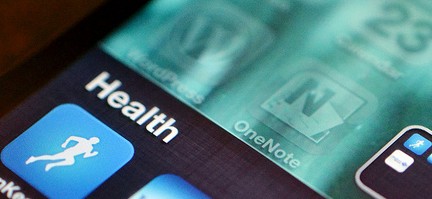Flex your apps
Apple’s new HealthKit collects data from all your body monitoring apps
Katherine Ellen Foley • October 22, 2014

There are so many apps available, integrating them might not be beneficial. [ Image credit: Flickr user Jason A Howie]
Apple’s been enjoying a lot of attention for its latest gadget drop. But lost in the shuffle of headlines over Apple’s new watch and latest phone was the debut of HealthKit, a feature of the iOS 8 operating system released last month. Healthkit is just what it sounds like – an aggregate of all the health monitoring apps you use, all in one place.
Fitness apps like HealthKit are nothing new and extremely popular: The business is expected to be worth $26 billion by 2017. With these apps and the hardware that goes with them such as Jawbone, Fitbit and NikeFuel bracelets, users can track anything from calories eaten and burned to sleep cycles. But do these apps really make us healthier?
Tracking mobile health apps that exist solely on mobile platforms store and calculate data correctly, but may be inaccurate. A study published in 2012 in Health Education and Behavior by researchers at Brigham Young University in Provo, Utah found that most apps are based on some accurate health information, such as the importance of tracking calories, but are shallow estimates at best. Most app creators have a background in programming, so their products are less likely to help users lose weight through healthy habit forming that considers both diet and exercise, according to the team.
Similarly, in a paper published in 2011 in Translational Behavior Medicine, researchers from the Center for Global Health Communication and Marketing and Duke University found among apps that act as weight journals, calorie trackers, or both, those that actually tracked both calorie consumption and burning tailored to individual users were few and far in between.
Programs with external equipment don’t rank much better than mobile-only apps. A study published this year in the Journal of Medical Internet Research by researchers at the University of Texas Medical Branch found — not surprisingly — that electronic wearable fitness apps work well for tracking overall health and wellness. But as far as comparisons among apps, a review by Rachel Metz at the MIT Technology Review found that three different wearable fitness monitors tracked a user taking 7,000, 10,000 and 12,000 steps when she wore them simultaneously. Another review from TopTenREVIEWS found that even though Fitbit was the most accurate, it still didn’t capture 100 percent of users’ activity, and calories still depend entirely on what users choose to enter.
The errors among body-monitoring technology suggest that a cohesive app like HealthKit may not be as beneficial as creators intended. What’s the real value in all this data if all tracking methods diverge and may misrepresent actual healthy behavior?
Technological health monitoring isn’t a bad thing. At the very least, counting calories makes users aware of how much they’re consuming and burning off throughout the day. Using an app to journal or monitor your activity won’t hurt, but it also may not help you actually lose weight based on your data. The fundamentals of exercise and weight loss haven’t really changed: you move more, you lose more. You don’t need a fancy app from Apple or elsewhere to tell you what you need to do to get healthy; go for a walk and eat a real apple instead.